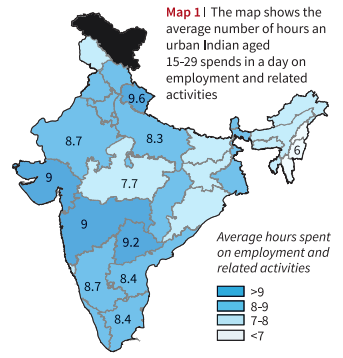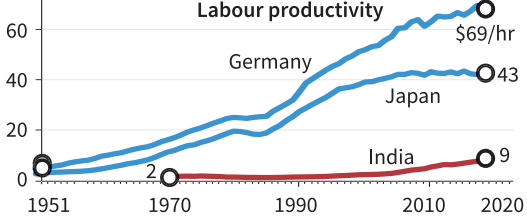Governance
The ‘70 Hour Work Week’ Idea
- 31 Oct 2023
- 11 min read
This editorial is based on “Putting the ‘70hour work week’ idea into perspective” which was published in The Hindu on 31 /10/2023. It talks about the Infosys founder Narayana Murthy's proposal that young Indians should commit to working 70 hours per week as a means to enhance the nation's productivity.
For Prelims: Demographic Dividend, Pradhan Mantri Kaushal Vikas Yojana (PMKVY), National Skills Qualifications Framework (NSQF), Recognition of Prior Learning (RPL), Digital India, Make in India, Ease of Doing Business, National Industrial Corridor Development, Biotechnology Industry Research Assistance Council (BIRAC), Goods and Services Tax (GST)
For Mains: 70-hour work week, Arguments in Favor of Long Working Hours, Arguments against Long Working Hours, Strike the Balance between Work and Life.
Infosys founder Narayana Murthy suggested that Indian youth should work 70 hours a week to improve the country's productivity. He emphasizes the need to improve India's work productivity, citing Germany and Japan as examples. A 70-hour work week, translating to nearly 12 hours of work for six days, raises both support and criticism.
How Many Hours Does an Average Young Indian Work at Present?
- According to the 2019 Time Use Survey, young Indians aged 15-29 spend over 7.2 hours a day on employment and related activities in rural areas and 8.5 hours a day in urban areas.
- When examining different states, it becomes evident that in urban Uttarakhand, young individuals put in an average of 9.6 hours of work per day, which is notably high, but it still falls short of meeting Murthy's proposed 70-hour workweek.
What are Arguments in Favor of the Long Working Hours?
- Leverage the Demographic Dividend :
- Share of India’s working age population to total population will reach its highest level at 68.9% by 2030.
- With a relatively young population (median age of 28.4 years), India gets a competitive advantage in terms of workforce.
- India really needs a dedicated labor force where young individuals are willing to put in 70 hours of work per week, all in the service of nation-building.
- Disciplined Work Culture :
- India's work culture must undergo a significant shift towards becoming highly determined, exceptionally disciplined, and diligent.
- Instead of reducing our efforts and focusing on unproductive habbits, this is the moment to wholeheartedly commit to the task of accomplishing in one generation what other nations have achieved over many years.
- Lessons from Germany and Japan :
- The average annual working hours of Germans and the Japanese peaked after the world war at about 2,200 hours to 2,400 hours a year — about 8.3 to 9 hours a day during a five day work week without holidays.
- In a swiftly progressing nation of our magnitude, the conventional 5-day workweek structure falls short. This generation is destined to propel India into
- the position of the world's largest economy, and it should be committed to this endeavor.
- Improve Labor Productivity :
- India’s work productivity is one of the lowest in the world. Unless we improve our work productivity, we will not be able to compete with those countries that have made tremendous progress.
- Opportunity for Skill Development :
- It's not essential to dedicate the full 70 hours exclusively to your company; instead, one can assign 40 hours to his/her professional responsibilities and set aside 30 hours for personal skill enhancement.
- The key is to invest those additional hours required to achieve mastery in one’s chosen field of expertise.
What are Arguments Against the Long Working Hours?
- Declining Productivity with Long Working Hours :
- Research consistently shows that productivity declines significantly after 50 hours of work per week and drops further after 55 hours.
- The absence of at least one full day off each week can negatively impact overall hourly output.
- Germany and Japan increased productivity while reducing working hours, with average annual working hours dropping to 1,400-1,600 hours a year.
- Imbalance in Work-life Equilibrium :
- Long work hours can lead to burnout, reduced job satisfaction, and an imbalance in work-life equilibrium.
- Longer work hours mean less time for sports and leisure, as Indians spend less time on these activities compared to Germany and Japan.
- Extended working hours can result in physical and mental fatigue, reduced family time, and hinder the body's natural recovery process.
- Health Implications:
- Sleep disturbances
- Increased risk of cardiovascular diseases.
- Obesity due to fast food and irregular meal timings.
- Mental health issues, including elevated stress levels, anxiety, and depression.
- Extra Burden on Working Women :
- Excessive working hours are challenging to manage childcare responsibilities for working mothers.
- Juggling long hours at work and family responsibilities can hinder career progression for working women.
What are the Government Schemes to Improve Productivity and Efficiency in India?
- Skill Development Initiatives: The government has launched various skill development programs like Pradhan Mantri Kaushal Vikas Yojana (PMKVY), National Skills Qualifications Framework (NSQF) and Recognition of Prior Learning(RPL) to enhance the employability of the workforce.
- Digital India: The Digital India initiative aims to boost efficiency through digitalization and increased access to online services, reducing bureaucracy and enhancing productivity.
- Make in India: Make in India campaign encourages investment in manufacturing and promotes economic growth, creating job opportunities and enhancing productivity.
- Startup India: Startup India fosters entrepreneurship, the government introduced Startup India, offering support and incentives to startups and small businesses.
- Ease of Doing Business Reforms: EoDB reforms aim to simplify regulations, streamline business processes, and make it easier for businesses to operate, thereby increasing productivity.
- National Industrial Corridor Development: Developing Industrial Corridors across the country helps attract investment, create jobs, and stimulate economic growth.
- Incentives for Research and Innovation: Programs like Atal Innovation Mission and Biotechnology Industry Research Assistance Council (BIRAC) provide support and incentives for research and innovation.
- Tax Reforms: Implementation of the Goods and Services Tax (GST) simplifies taxation and boosts efficiency for businesses.
How to Strike the Balance between Work and Life ?
- Enhance Productivity through Technology :
- Adopt digital technologies and artificial intelligence to streamline processes, reduce manual work, and improve efficiency.
- Invest in technical education to equip the workforce with the skills needed to leverage advanced tools and systems.
- Focus on Output:
- Time spent at the workplace does not necessarily correlate with higher output or productivity.
- Productivity depends on both time and capital, making it essential to invest in the correct tools and resources.
- Promote Growth and promising Future :
- To motivate our youth, we must place them in roles that challenge and promote growth.
- When hard work leads to a promising future, individuals naturally give their best.
- Organizations should foster a culture of transparency, trust, and meritocracy.
- Prioritize Self-Care:
- Make sure to set aside time for activities that help to relax and recharge, such as exercise, hobbies, and spending time with loved ones.
- Aim for at least 7-8 hours of quality sleep each night to ensure the body and mind have time to rest and recover.
Conclusion
Certainly, hard work is the foundation of success, but it's not just about the hours put in; it's the dedication and enthusiasm that matter. The goal is to make work fulfilling, allowing a seamless integration of work and personal life. When young professionals are passionate and purpose-driven, achieving work-life harmony becomes a natural outcome.
|
Drishti Mains Question: Critically examine the need for extended working hours as a means to enhance productivity and drive economic growth in India. |
UPSC Civil Services Examination Previous Year Question (PYQ)
Prelims
Q. With reference to Pradhan Mantri Kaushal Vikas Yojana, consider the following statements:
- It is the flagship scheme of the Ministry of Labour and Employment.
- It, among other things, will also impart training in soft skills, entrepreneurship, financial and digital literacy.
- It aims to align the competencies of the unregulated workforce of the country to the National Skill Qualification Framework.
Which of the statements given above is/are correct? (2018)
(a) 1 and 3 only
(b) 2 only
(c) 2 and 3 only
(d) 1, 2 and 3
Ans: C
Mains
Q: “The growth of cities as I.T. hubs has opened up new avenues of employment, but has also created new problems”. Substantiate this statement with examples.






